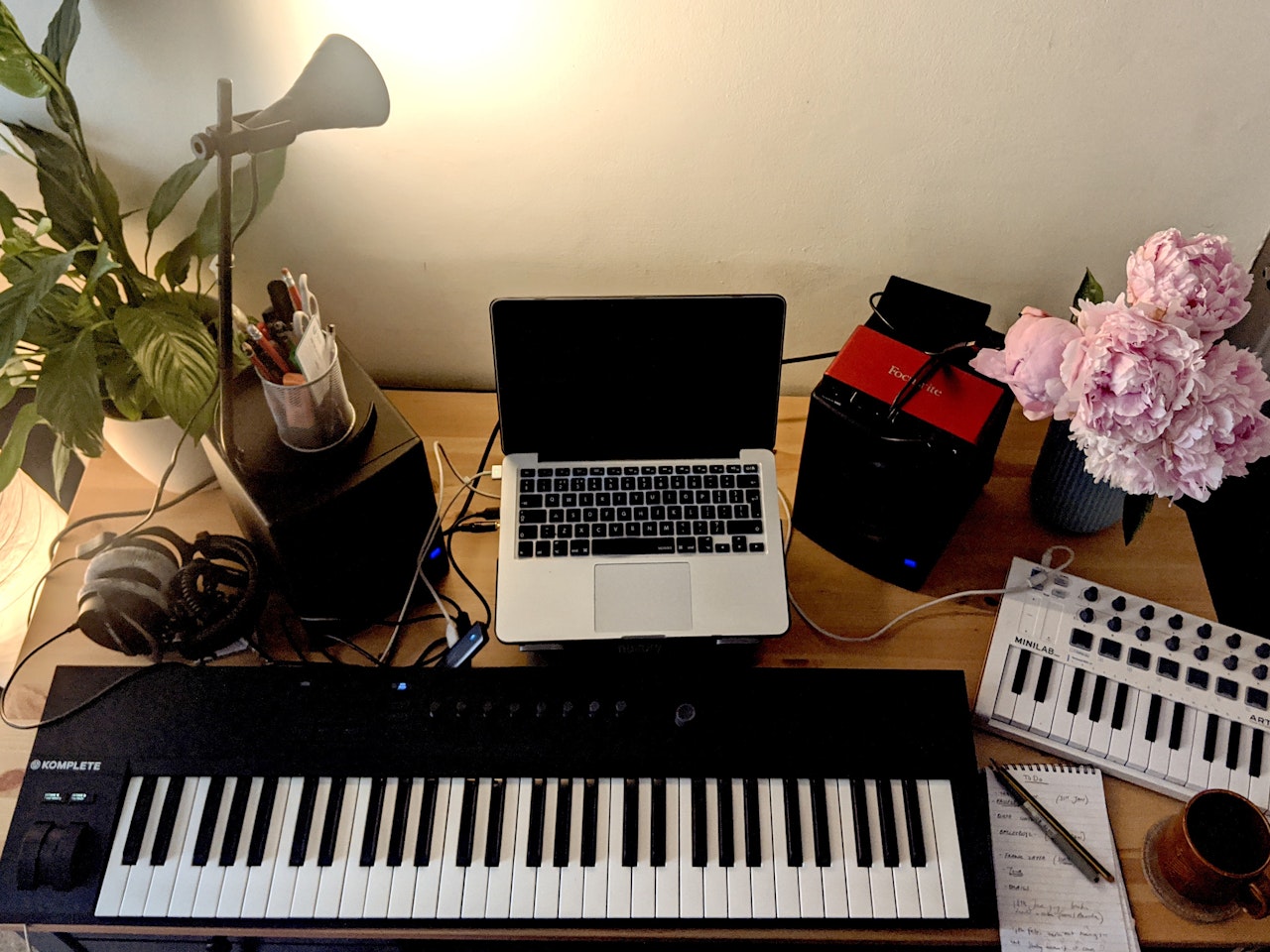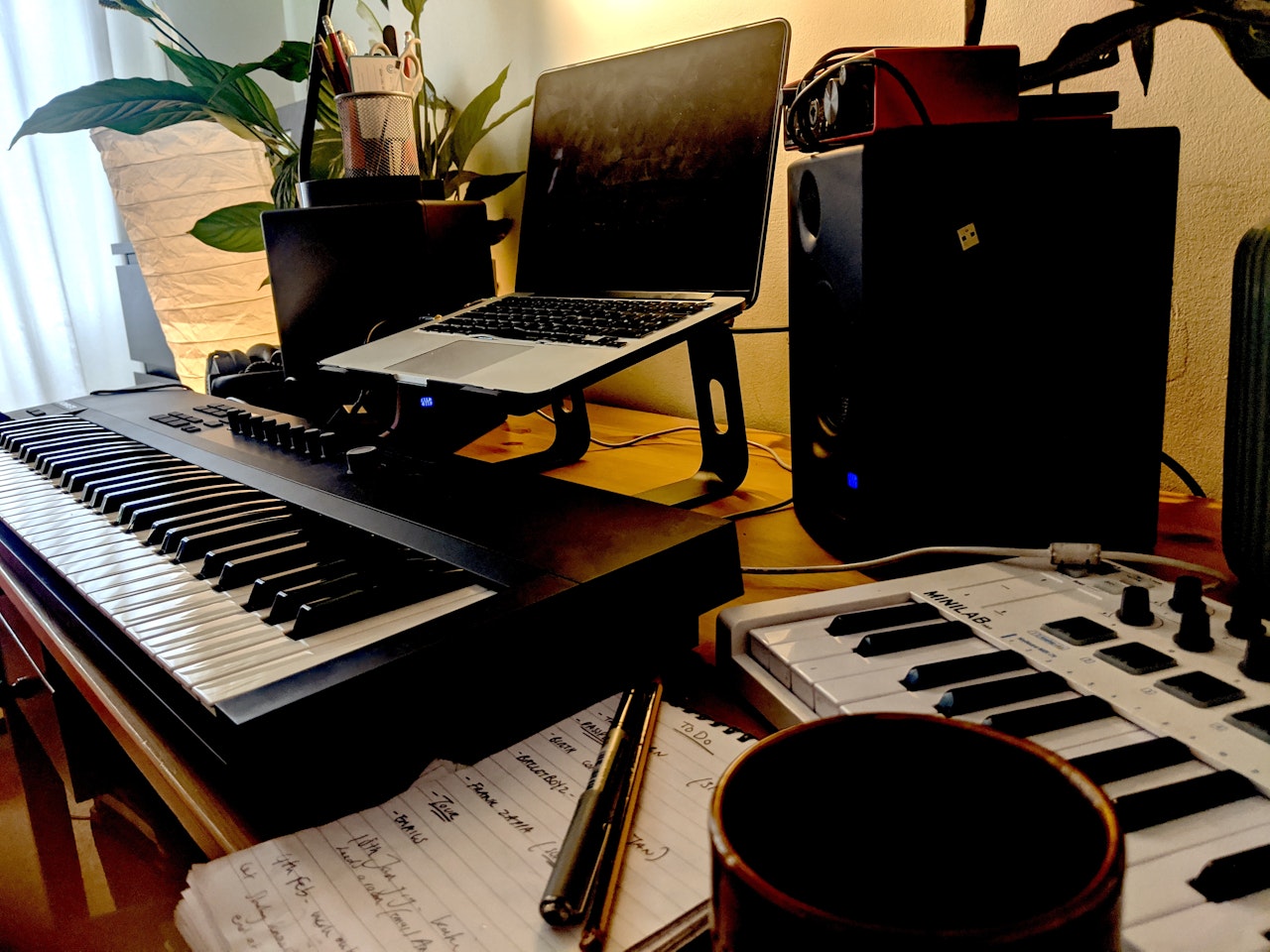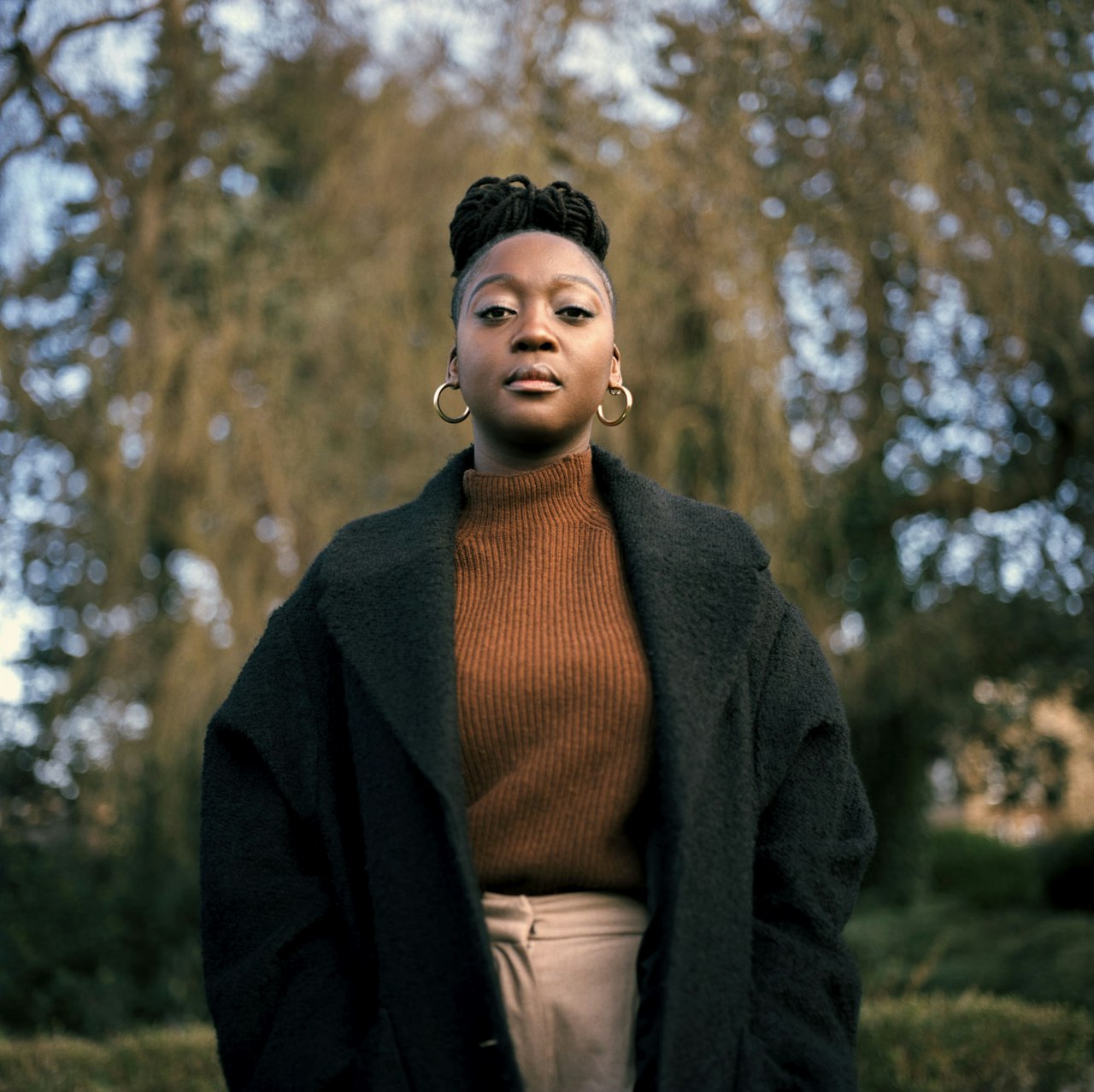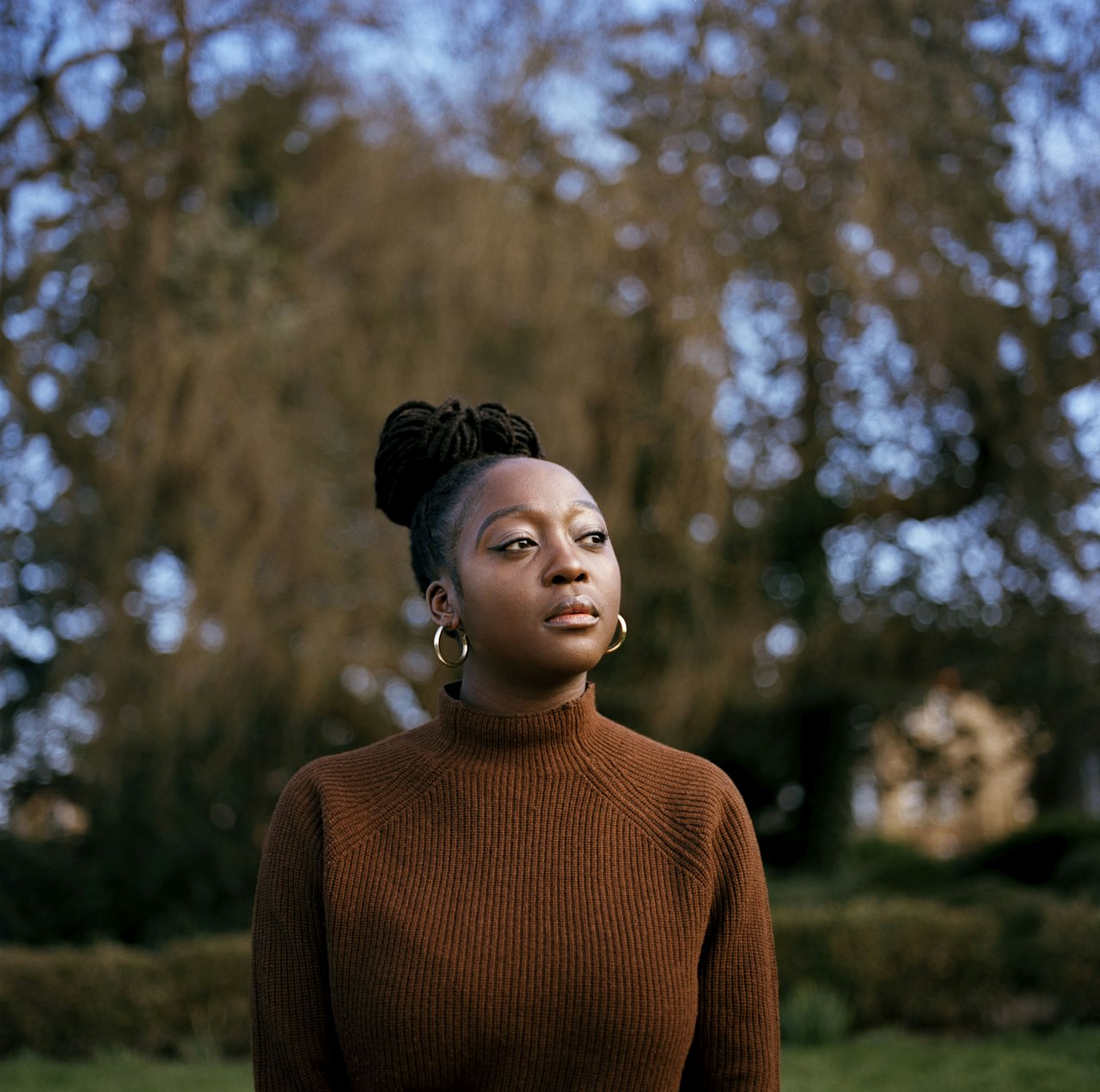Words by Emma Warren
Cassie Kinoshi would have been at Sadler’s Wells last month, watching her score for BalletBoyz new show ‘Deluxe’ performed. Covid-19 put a pause to that – but not without the glow of seeing her name on the credits of the live stream.
“It was a shame we didn’t get to perform it live because that would have been a whole other level,” she says, “but at the same time, it’s been a dream of mine to have my name on TV listed as composer on the credits. So that was also a lovely way to share that piece of art.”
The piece, produced by Punch Drunk’s Maxine Doyle was six months in the making. Kinoshi sat in on early-stage rehearsals ‘to get a taste for the movement and the feeling of the piece’ and then started composing ideas in the corner of the room using a travelling set-up of laptop, studio headphones and an Arturia Minilab MkII keyboard.
Whilst ‘Deluxe' was her first major dance commission she’s been writing for theatre since graduating from Trinity Laban with a BMus(Hons) in Composition in 2015. Since then, she’s picked up residencies at Dundee Rep and at the London Symphony Orchestra and has written multiple scores for theatre including ‘Top Girls’ at the National, Inua Ellam’s version of ‘The Little Prince’ at Stratford Circus Arts Centre and a growing list of productions at the Old Vic. Sometimes she’s writing for ensemble, other times compositions rely on a laptop and a determined creativity to rinse the most exciting soundscapes out of libraries, field recordings and plug-ins in Logic.
"What’s my digging style when it comes to sample libraries?,” says the composer, who grew up in Welwyn Garden City, Hertfordshire. “I’ll always watch videos of other composers using it,” she says. "I’ll experiment and improvise and write little taster tunes. It all comes from experimenting and figuring out what sounds I like."
Other times she’ll write for SEED Ensemble, her ten-piece band with six horns and a four-piece rhythm section who were nominated for the Mercury Prize last year for their album ‘Driftglass’. SEED isn’t her only band, though. She’s a longstanding member of all-star afrobeat outfit Kokoroko whose ‘Abusey Junction’ has 37 millions play on YouTube as well as Domino-signed seven-piece Nérija. She recently started a new band, Brown Penny, to explore her love of rock, metal and electronic music.
All of the bands I’m in are just another layer of who I am as a person, as a composer. They all draw from the music I grew up loving and the different areas of music I’m in love with. They feed into each other. Whatever you absorb will come out in what you write, as an amalgamation of everything.
Years playing live in multiple bands gives her the capacity her to respond spontaneously. “You’re composing in the moment, which is fun to try and recreate in written composition. It gives me that mindset to give performers and musicians the chance to feed their own voices into it. I’m always very open to things changing.”
“Composing music by myself in my room, you have complete control. You’re feeding off your own energy. Being in a band it’s going back to that openness, allowing yourself to be receptive to other people’s ideas, creating something together.”
Writing with SEED has given her insight into what it means to truly give an idea away and let people bring their own voices into a score. “That’s one of the scariest things as a composer, but it’s also one of the most exciting and it feeds into a lot of my other work. The music grows and becomes something else by working with other people.”


Her first forays into scoring were with videographer, choreographer and then-roommate Anne Verheij, on short films which were shown at the London Short Film Festival. “We were focused on improvisation, responding real time and using field recordings… very electronic, manipulated sound, sound design. We went to the docks at the side of the Thames and recorded a dancer improvising. She’d edit the film, to my electronic soundtrack. It was a different type of collaboration.”
Improvisation is a big part of her process. “It’s nice to have some structure in place, whether that’s an idea or an emotion, but the way I compose – it’s just ideas that pop up in my head: a bassline, a drum beat a melody. The rest of the composition will take form around that. I have tried to sit down and make a plan, draw a line on a page, mark out where I want something to happen. It doesn’t really work for me but I can see how it would work if I was writing for something a bit more rigid.”
She works with simple but effective kit: A second-hand Macbook Pro (“modded for more space so I can fit my libraries”), Presonus Aerostat E5 monitors, Native Instruments Komplete A61 keyboard, and a Focusrite Scarlett 2i2 for home recording. “I’m still in the process of collecting good microphones,” she says, adding that she’s got a Sennheiser MD441u in her sights ‘because the live sound is really beautiful’.” It’s a literal bedroom studio, with a guitar, vinyl, artwork on the walls and shelves full of CDs and books for inspiration and enjoyment.
Kinoshi’s main instrument is the saxophone, an instrument that has attracted a long list of player-thinkers who articulate ideas as well as sound. So what does she believe to be the job of the composer? “Composition and writing music is all about storytelling and the sharing of an experience. Your job to set up the structures for that world and to allow the musicians to bring it to life – and allowing the audiences to step into that world.”


It remains a busy time, despite the pressures of Covid-19 and global unrest and she’s just been commissioned by the London Sinfonetta to write a piece for their ensemble for the next London Jazz Festival – whenever that ends up happening. Everyone needs a stress release, and gaming gives her the downtime she needs. She’s recently revisited Red Dead Redemption, has the latest Lara Croft lined up and has been replaying The Last Of Us. “I love games. It’s one of the reasons I wanted to study composition at Conservatoire was because I wanted – and still want – to write video game scores,” she says. She remembers noticing the music to Spyro, Year of the Dragon. “The score was written by The Police drummer Stuart Copeland. It was very memorable, very percussion-heavy and very original. It stuck with me. The very first bit of composition I did was taking the advert for Fable and writing my own score for it,” she says. “Gaming is a huge inspiration to me.”
In the early days, she was supported by educators Tomorrow’s Warriors who have been nurturing next generation music for two decades, focusing specifically on girls and those of African heritage. They’re widely acknowledged as having played a large part in the current upsurge of young musicians taking Great Black American music to new levels, with bands like Ezra Collective and Shabaka Hutchings pushing creative and commercial boundaries. Does composition need a Tomorrow’s Warriors for the next generation? “Yes. A lot of people aren’t really aware of the routes into composition for film or TV. Tomorrow’s Warriors noticed that I enjoyed composing and put me forward for opportunities,” she says. “One of my life goals is to set up an educational facility that helps people, particularly young Black people and especially young Black women, understand the route into composing for film. I’m working on it.”
